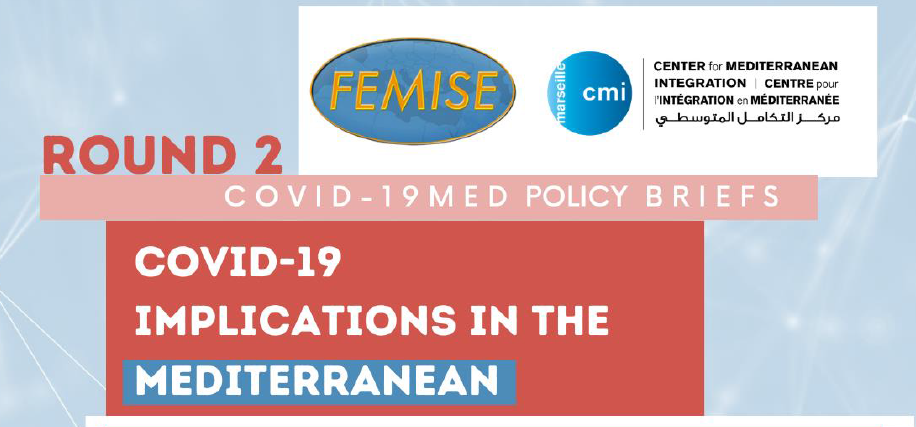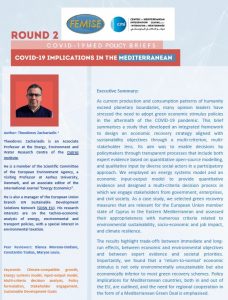
The coronavirus has proved to be a serious threat not only to people’s health but also to economies and societies of all countries, regardless of their level of development. This crisis presents a real test to the resilience of the Southern and Eastern Mediterranean countries, as it came at a time when they were challenged to keep their economies growing, facing increasing unemployment and scarce resources. The way out of the crisis will greatly depend on how countries in the region prioritise their actions, and on how they integrate and cooperate with each other in key sectors. Following the success of the first round of “COVID-19 MED BRIEFS” launched by the Center for Mediterranean Integration (CMI) and FEMISE, the two institutions decided to join forces again and launch a second round. This series of Policy Briefs is intended to pave the way for more in-depth thematic analyses and recommendations.
The nineteenth COVID-19 MED BRIEF, entitled “Designing Realistic Green Economic Recovery Plans after the COVID-19 Pandemic: Evidence from Cyprus and Policy Implications for the Mediterranean” by Theodoros Zachariadis is available here
 Summary : As current production and consumption patterns of humanity exceed planetary boundaries, many opinion leaders have stressed the need to adopt green economic stimulus policies in the aftermath of the COVID-19 pandemic.
Summary : As current production and consumption patterns of humanity exceed planetary boundaries, many opinion leaders have stressed the need to adopt green economic stimulus policies in the aftermath of the COVID-19 pandemic.
This brief summarises a study that developed an integrated framework to design an economic recovery strategy aligned with sustainability objectives through a multi-criterion, multi-stakeholder lens. Its aim was to enable decisions by policymakers through transparent processes that include both expert evidence based on quantitative open-source modelling, and qualitative input by diverse social actors in a participatory approach.
We employed an energy systems model and an economic input-output model to provide quantitative evidence and designed a multi-criteria decision process in which we engage stakeholders from government, enterprises, and civil society.
As a case study, we selected green recovery measures that are relevant for the European Union member state of Cyprus in the Eastern Mediterranean and assessed their appropriateness with numerous criteria related to environmental sustainability, socio-economic and job impact, and climate resilience.
The results highlight trade-offs between immediate and long-run effects, between economic and environmental objectives and between expert evidence and societal priorities. Importantly, we found that a ‘return-to-normal’ economic stimulus is not only environmentally unsustainable but also economically inferior to most green recovery schemes. Policy implications for Mediterranean countries, both in and out of the EU, are outlined, and the need for regional cooperation in the form of a Mediterranean Green Deal is emphasized.
This Policy Brief is produced as part of the series of Policy Briefs on « Responding to the Challenges of COVID-19 in the Mediterranean » that is undertaken in partnership between FEMISE and the Center for Mediterranean Integration (CMI).
The views expressed in this Brief are those of the authors and do not reflect the views of CMI or FEMISE. The contents have not been subjected to verification by CMI or FEMISE and their publication does not reflect ownership by CMI or FEMISE.


